Taxation Law Assignment: Our Earth Pty Ltd & Coffee Bean Pty Ltd
VerifiedAdded on 2023/01/23
|15
|3921
|71
Homework Assignment
AI Summary
This assignment solution addresses two key taxation law questions. The first question examines the tax treatment of compensation received by Our Earth Pty Ltd for patent infringement and lost revenue, including the classification of damages, interest, and legal fee reimbursements under Australian tax law. The analysis considers relevant cases and legislation, determining the assessable income components. The second question focuses on the tax implications of land subdivision and sale, exploring whether profits are considered ordinary income or capital gains, and the application of CGT rules, pre and post CGT assets, and profit making schemes. The solution provides detailed explanations, case references, and calculations to support the conclusions, offering a comprehensive overview of the tax principles involved.
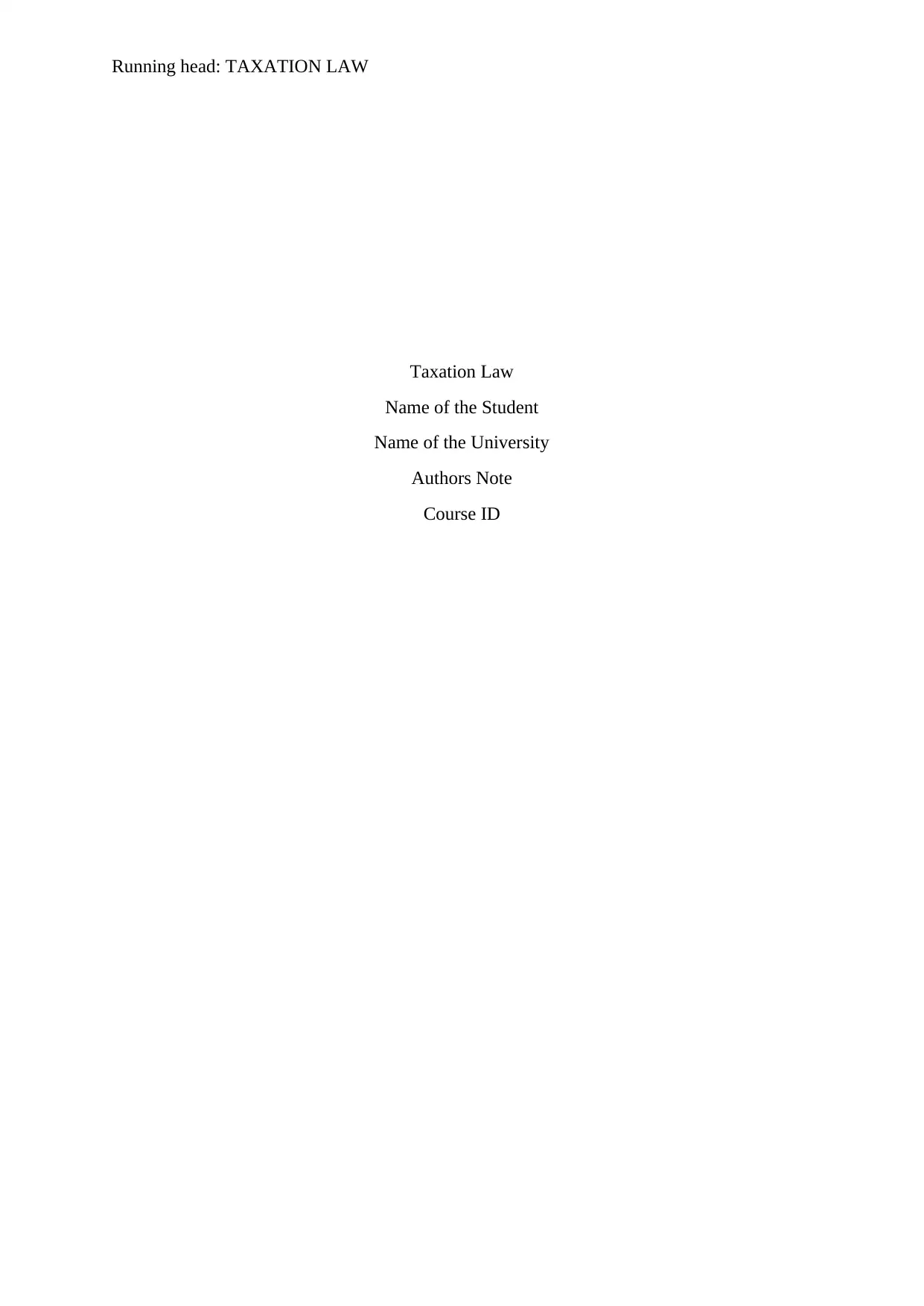
Running head: TAXATION LAW
Taxation Law
Name of the Student
Name of the University
Authors Note
Course ID
Taxation Law
Name of the Student
Name of the University
Authors Note
Course ID
Paraphrase This Document
Need a fresh take? Get an instant paraphrase of this document with our AI Paraphraser
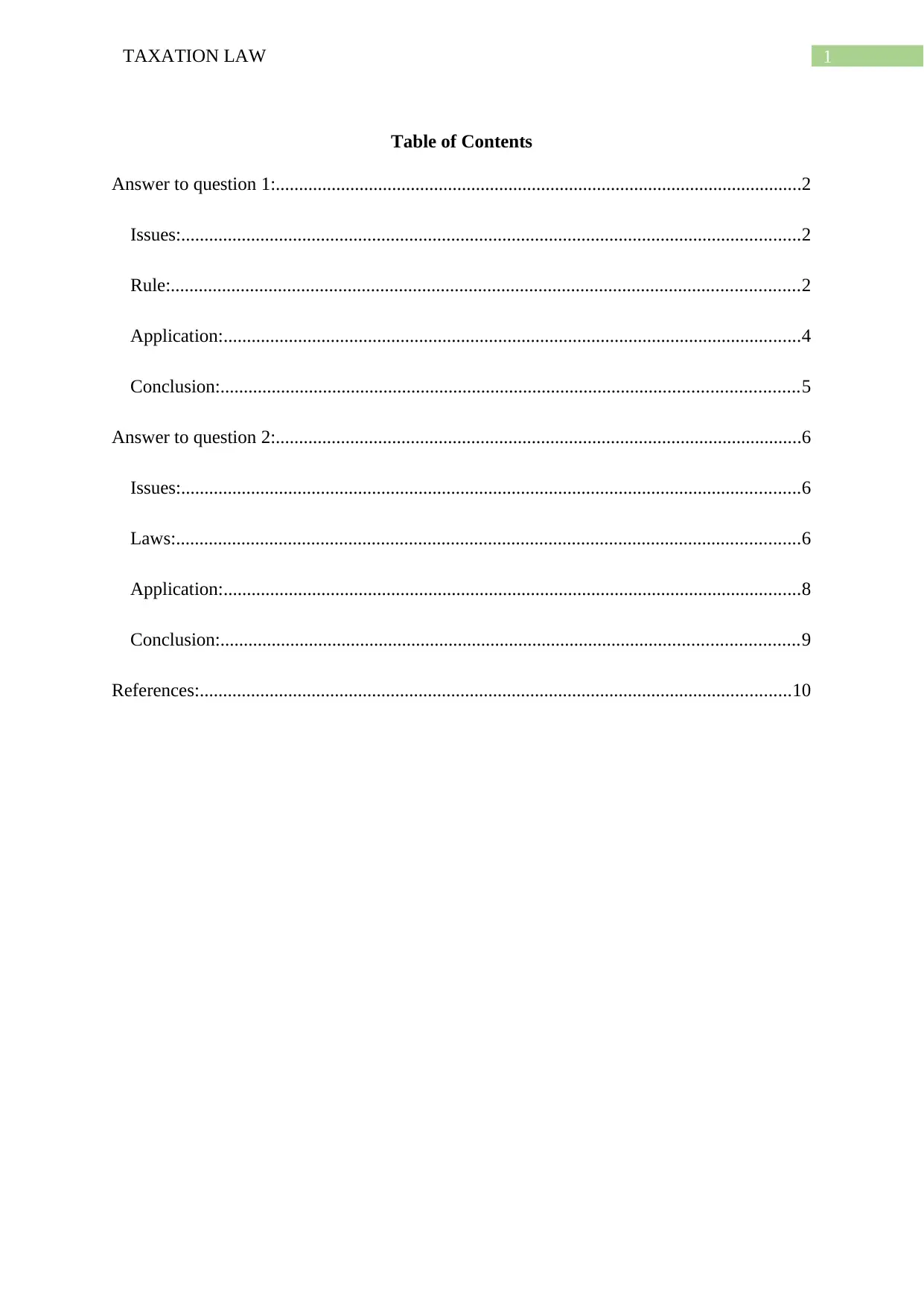
1TAXATION LAW
Table of Contents
Answer to question 1:.................................................................................................................2
Issues:.....................................................................................................................................2
Rule:.......................................................................................................................................2
Application:............................................................................................................................4
Conclusion:............................................................................................................................5
Answer to question 2:.................................................................................................................6
Issues:.....................................................................................................................................6
Laws:......................................................................................................................................6
Application:............................................................................................................................8
Conclusion:............................................................................................................................9
References:...............................................................................................................................10
Table of Contents
Answer to question 1:.................................................................................................................2
Issues:.....................................................................................................................................2
Rule:.......................................................................................................................................2
Application:............................................................................................................................4
Conclusion:............................................................................................................................5
Answer to question 2:.................................................................................................................6
Issues:.....................................................................................................................................6
Laws:......................................................................................................................................6
Application:............................................................................................................................8
Conclusion:............................................................................................................................9
References:...............................................................................................................................10
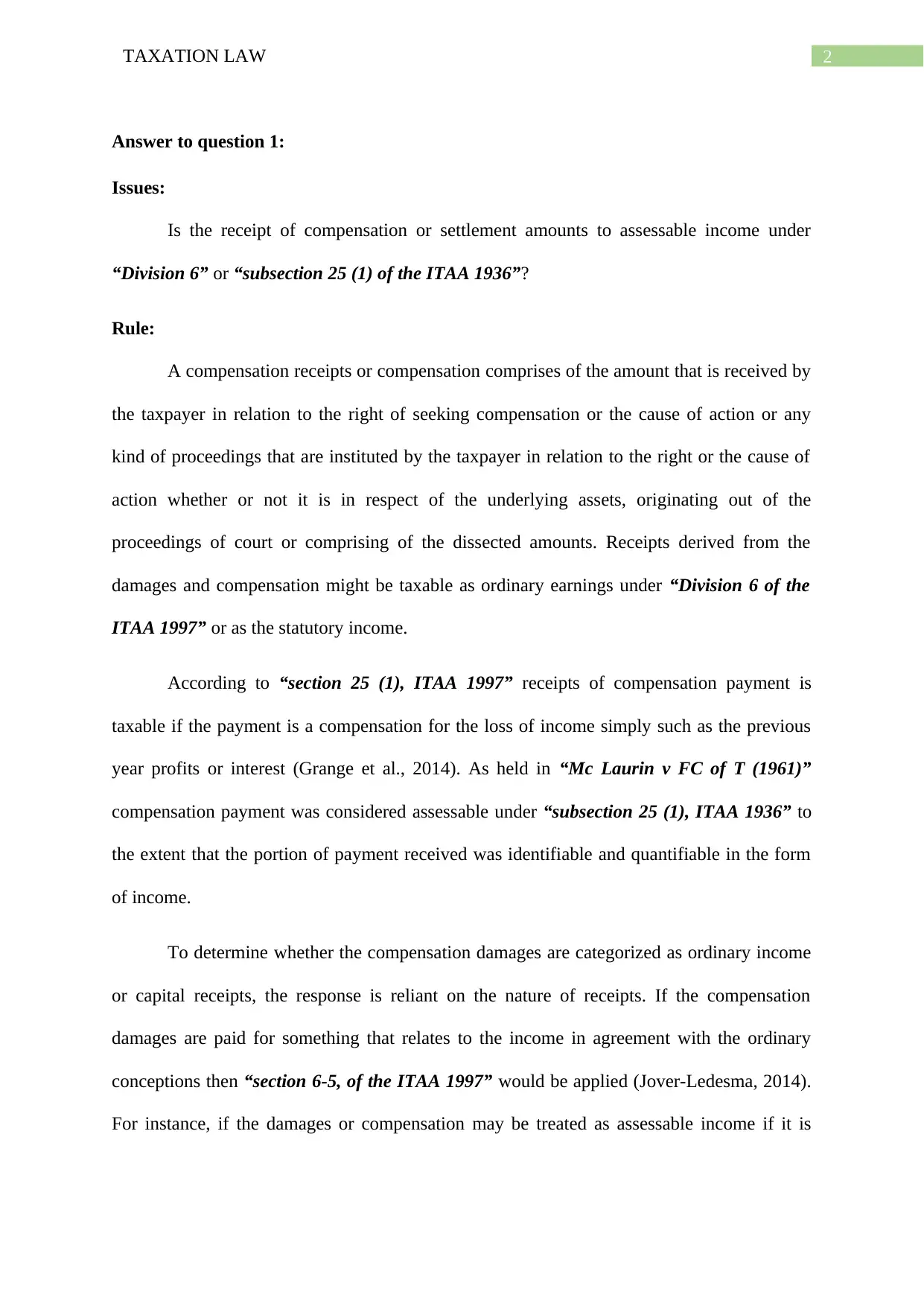
2TAXATION LAW
Answer to question 1:
Issues:
Is the receipt of compensation or settlement amounts to assessable income under
“Division 6” or “subsection 25 (1) of the ITAA 1936”?
Rule:
A compensation receipts or compensation comprises of the amount that is received by
the taxpayer in relation to the right of seeking compensation or the cause of action or any
kind of proceedings that are instituted by the taxpayer in relation to the right or the cause of
action whether or not it is in respect of the underlying assets, originating out of the
proceedings of court or comprising of the dissected amounts. Receipts derived from the
damages and compensation might be taxable as ordinary earnings under “Division 6 of the
ITAA 1997” or as the statutory income.
According to “section 25 (1), ITAA 1997” receipts of compensation payment is
taxable if the payment is a compensation for the loss of income simply such as the previous
year profits or interest (Grange et al., 2014). As held in “Mc Laurin v FC of T (1961)”
compensation payment was considered assessable under “subsection 25 (1), ITAA 1936” to
the extent that the portion of payment received was identifiable and quantifiable in the form
of income.
To determine whether the compensation damages are categorized as ordinary income
or capital receipts, the response is reliant on the nature of receipts. If the compensation
damages are paid for something that relates to the income in agreement with the ordinary
conceptions then “section 6-5, of the ITAA 1997” would be applied (Jover-Ledesma, 2014).
For instance, if the damages or compensation may be treated as assessable income if it is
Answer to question 1:
Issues:
Is the receipt of compensation or settlement amounts to assessable income under
“Division 6” or “subsection 25 (1) of the ITAA 1936”?
Rule:
A compensation receipts or compensation comprises of the amount that is received by
the taxpayer in relation to the right of seeking compensation or the cause of action or any
kind of proceedings that are instituted by the taxpayer in relation to the right or the cause of
action whether or not it is in respect of the underlying assets, originating out of the
proceedings of court or comprising of the dissected amounts. Receipts derived from the
damages and compensation might be taxable as ordinary earnings under “Division 6 of the
ITAA 1997” or as the statutory income.
According to “section 25 (1), ITAA 1997” receipts of compensation payment is
taxable if the payment is a compensation for the loss of income simply such as the previous
year profits or interest (Grange et al., 2014). As held in “Mc Laurin v FC of T (1961)”
compensation payment was considered assessable under “subsection 25 (1), ITAA 1936” to
the extent that the portion of payment received was identifiable and quantifiable in the form
of income.
To determine whether the compensation damages are categorized as ordinary income
or capital receipts, the response is reliant on the nature of receipts. If the compensation
damages are paid for something that relates to the income in agreement with the ordinary
conceptions then “section 6-5, of the ITAA 1997” would be applied (Jover-Ledesma, 2014).
For instance, if the damages or compensation may be treated as assessable income if it is
⊘ This is a preview!⊘
Do you want full access?
Subscribe today to unlock all pages.

Trusted by 1+ million students worldwide
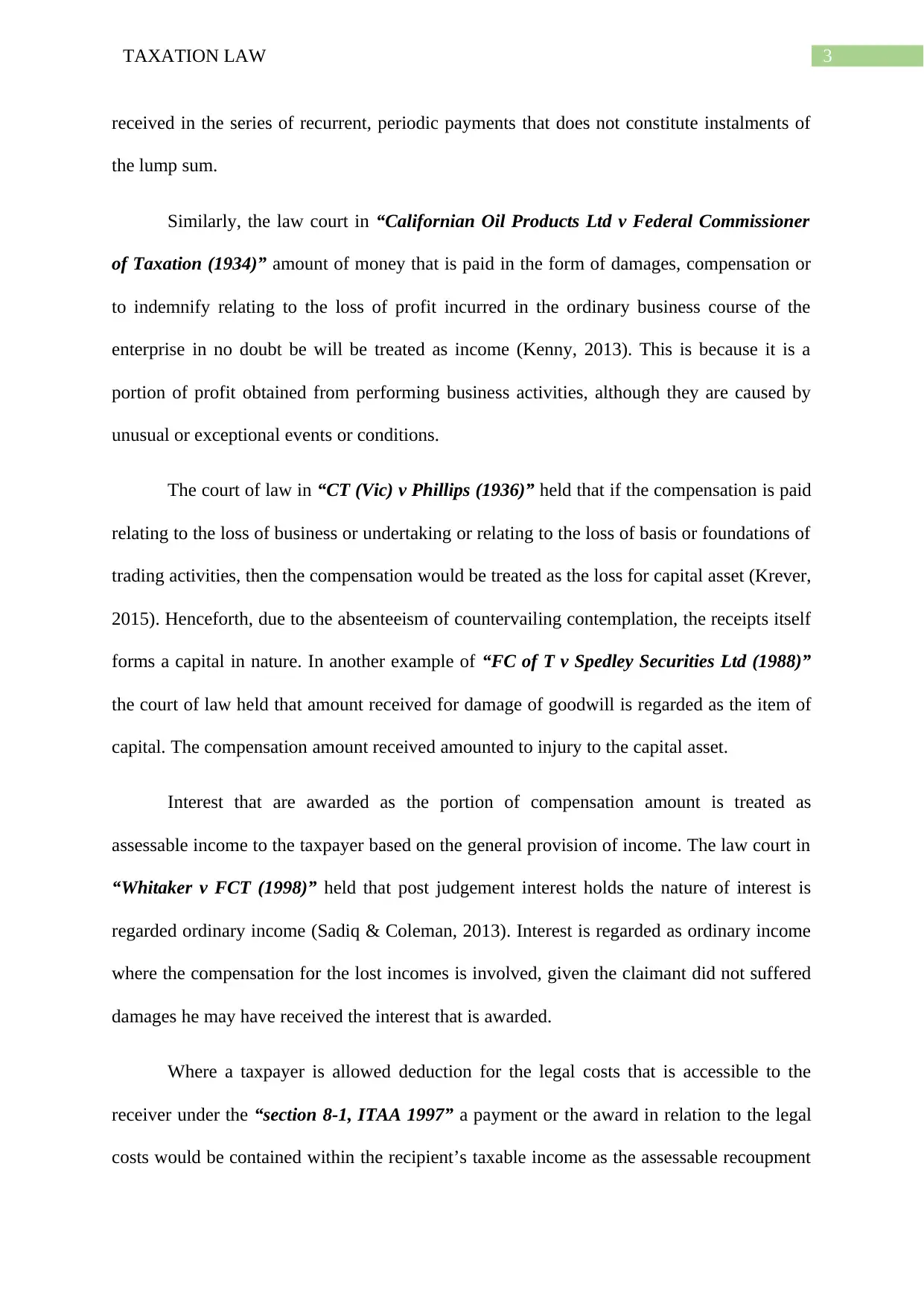
3TAXATION LAW
received in the series of recurrent, periodic payments that does not constitute instalments of
the lump sum.
Similarly, the law court in “Californian Oil Products Ltd v Federal Commissioner
of Taxation (1934)” amount of money that is paid in the form of damages, compensation or
to indemnify relating to the loss of profit incurred in the ordinary business course of the
enterprise in no doubt be will be treated as income (Kenny, 2013). This is because it is a
portion of profit obtained from performing business activities, although they are caused by
unusual or exceptional events or conditions.
The court of law in “CT (Vic) v Phillips (1936)” held that if the compensation is paid
relating to the loss of business or undertaking or relating to the loss of basis or foundations of
trading activities, then the compensation would be treated as the loss for capital asset (Krever,
2015). Henceforth, due to the absenteeism of countervailing contemplation, the receipts itself
forms a capital in nature. In another example of “FC of T v Spedley Securities Ltd (1988)”
the court of law held that amount received for damage of goodwill is regarded as the item of
capital. The compensation amount received amounted to injury to the capital asset.
Interest that are awarded as the portion of compensation amount is treated as
assessable income to the taxpayer based on the general provision of income. The law court in
“Whitaker v FCT (1998)” held that post judgement interest holds the nature of interest is
regarded ordinary income (Sadiq & Coleman, 2013). Interest is regarded as ordinary income
where the compensation for the lost incomes is involved, given the claimant did not suffered
damages he may have received the interest that is awarded.
Where a taxpayer is allowed deduction for the legal costs that is accessible to the
receiver under the “section 8-1, ITAA 1997” a payment or the award in relation to the legal
costs would be contained within the recipient’s taxable income as the assessable recoupment
received in the series of recurrent, periodic payments that does not constitute instalments of
the lump sum.
Similarly, the law court in “Californian Oil Products Ltd v Federal Commissioner
of Taxation (1934)” amount of money that is paid in the form of damages, compensation or
to indemnify relating to the loss of profit incurred in the ordinary business course of the
enterprise in no doubt be will be treated as income (Kenny, 2013). This is because it is a
portion of profit obtained from performing business activities, although they are caused by
unusual or exceptional events or conditions.
The court of law in “CT (Vic) v Phillips (1936)” held that if the compensation is paid
relating to the loss of business or undertaking or relating to the loss of basis or foundations of
trading activities, then the compensation would be treated as the loss for capital asset (Krever,
2015). Henceforth, due to the absenteeism of countervailing contemplation, the receipts itself
forms a capital in nature. In another example of “FC of T v Spedley Securities Ltd (1988)”
the court of law held that amount received for damage of goodwill is regarded as the item of
capital. The compensation amount received amounted to injury to the capital asset.
Interest that are awarded as the portion of compensation amount is treated as
assessable income to the taxpayer based on the general provision of income. The law court in
“Whitaker v FCT (1998)” held that post judgement interest holds the nature of interest is
regarded ordinary income (Sadiq & Coleman, 2013). Interest is regarded as ordinary income
where the compensation for the lost incomes is involved, given the claimant did not suffered
damages he may have received the interest that is awarded.
Where a taxpayer is allowed deduction for the legal costs that is accessible to the
receiver under the “section 8-1, ITAA 1997” a payment or the award in relation to the legal
costs would be contained within the recipient’s taxable income as the assessable recoupment
Paraphrase This Document
Need a fresh take? Get an instant paraphrase of this document with our AI Paraphraser
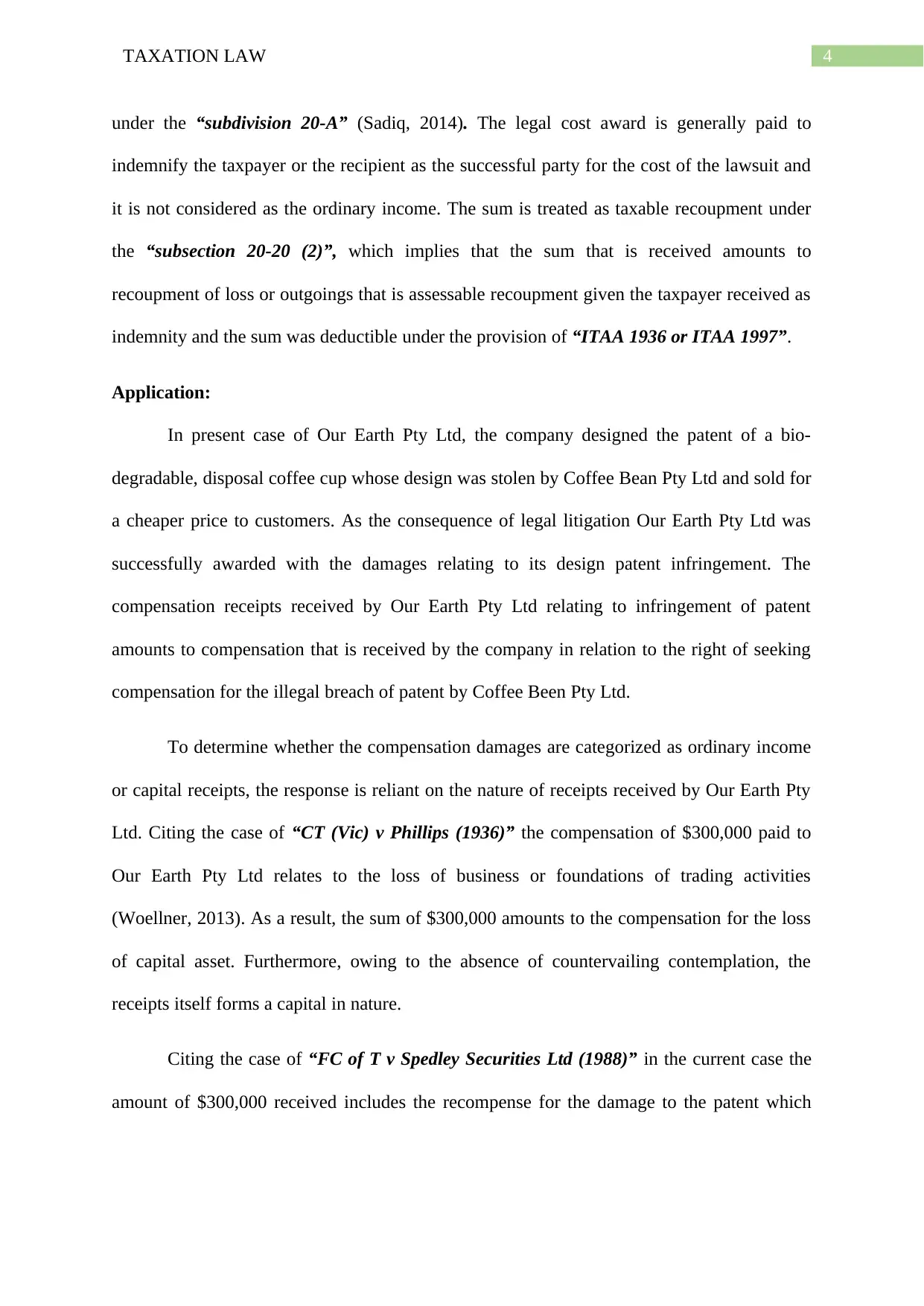
4TAXATION LAW
under the “subdivision 20-A” (Sadiq, 2014). The legal cost award is generally paid to
indemnify the taxpayer or the recipient as the successful party for the cost of the lawsuit and
it is not considered as the ordinary income. The sum is treated as taxable recoupment under
the “subsection 20-20 (2)”, which implies that the sum that is received amounts to
recoupment of loss or outgoings that is assessable recoupment given the taxpayer received as
indemnity and the sum was deductible under the provision of “ITAA 1936 or ITAA 1997”.
Application:
In present case of Our Earth Pty Ltd, the company designed the patent of a bio-
degradable, disposal coffee cup whose design was stolen by Coffee Bean Pty Ltd and sold for
a cheaper price to customers. As the consequence of legal litigation Our Earth Pty Ltd was
successfully awarded with the damages relating to its design patent infringement. The
compensation receipts received by Our Earth Pty Ltd relating to infringement of patent
amounts to compensation that is received by the company in relation to the right of seeking
compensation for the illegal breach of patent by Coffee Been Pty Ltd.
To determine whether the compensation damages are categorized as ordinary income
or capital receipts, the response is reliant on the nature of receipts received by Our Earth Pty
Ltd. Citing the case of “CT (Vic) v Phillips (1936)” the compensation of $300,000 paid to
Our Earth Pty Ltd relates to the loss of business or foundations of trading activities
(Woellner, 2013). As a result, the sum of $300,000 amounts to the compensation for the loss
of capital asset. Furthermore, owing to the absence of countervailing contemplation, the
receipts itself forms a capital in nature.
Citing the case of “FC of T v Spedley Securities Ltd (1988)” in the current case the
amount of $300,000 received includes the recompense for the damage to the patent which
under the “subdivision 20-A” (Sadiq, 2014). The legal cost award is generally paid to
indemnify the taxpayer or the recipient as the successful party for the cost of the lawsuit and
it is not considered as the ordinary income. The sum is treated as taxable recoupment under
the “subsection 20-20 (2)”, which implies that the sum that is received amounts to
recoupment of loss or outgoings that is assessable recoupment given the taxpayer received as
indemnity and the sum was deductible under the provision of “ITAA 1936 or ITAA 1997”.
Application:
In present case of Our Earth Pty Ltd, the company designed the patent of a bio-
degradable, disposal coffee cup whose design was stolen by Coffee Bean Pty Ltd and sold for
a cheaper price to customers. As the consequence of legal litigation Our Earth Pty Ltd was
successfully awarded with the damages relating to its design patent infringement. The
compensation receipts received by Our Earth Pty Ltd relating to infringement of patent
amounts to compensation that is received by the company in relation to the right of seeking
compensation for the illegal breach of patent by Coffee Been Pty Ltd.
To determine whether the compensation damages are categorized as ordinary income
or capital receipts, the response is reliant on the nature of receipts received by Our Earth Pty
Ltd. Citing the case of “CT (Vic) v Phillips (1936)” the compensation of $300,000 paid to
Our Earth Pty Ltd relates to the loss of business or foundations of trading activities
(Woellner, 2013). As a result, the sum of $300,000 amounts to the compensation for the loss
of capital asset. Furthermore, owing to the absence of countervailing contemplation, the
receipts itself forms a capital in nature.
Citing the case of “FC of T v Spedley Securities Ltd (1988)” in the current case the
amount of $300,000 received includes the recompense for the damage to the patent which
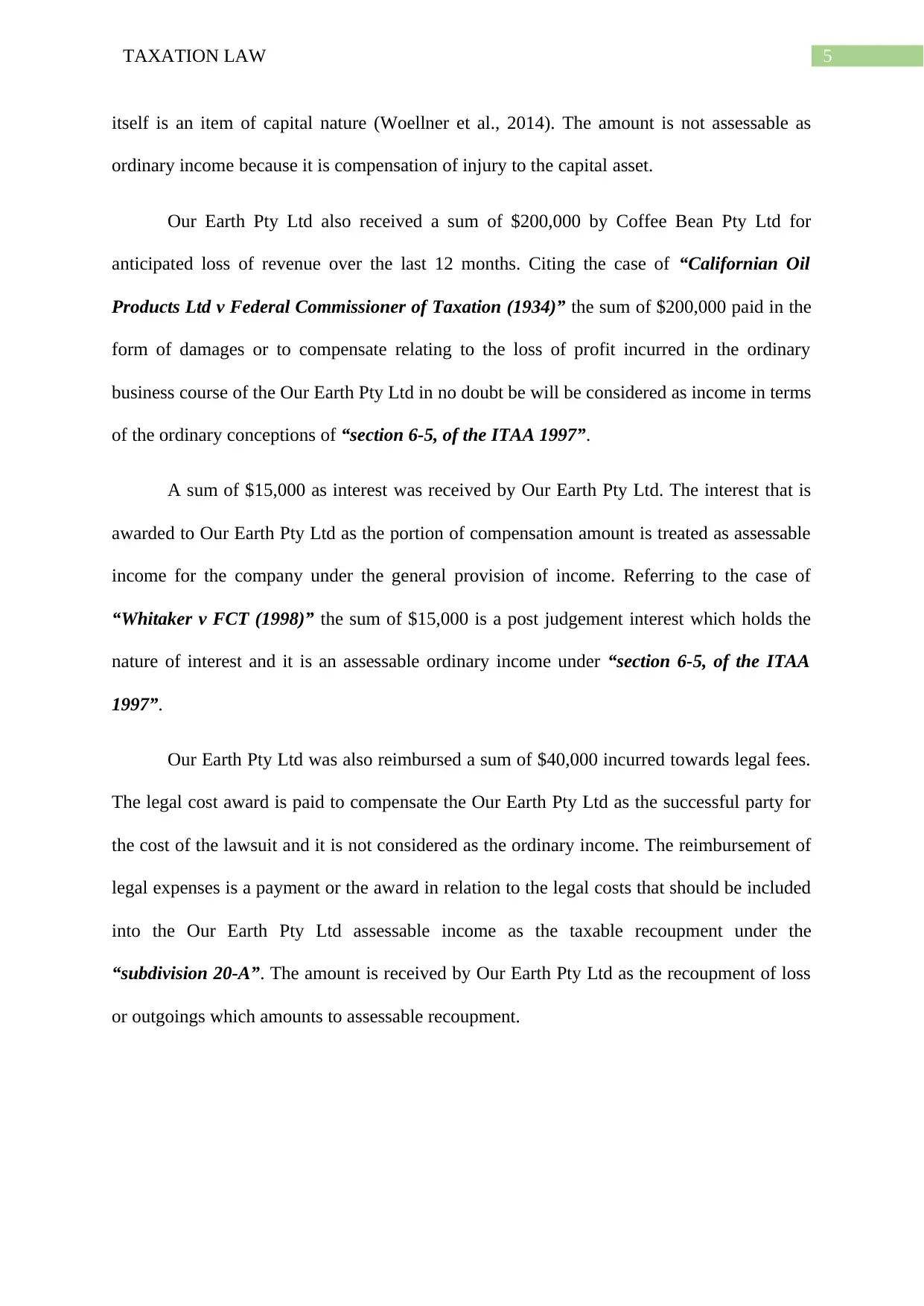
5TAXATION LAW
itself is an item of capital nature (Woellner et al., 2014). The amount is not assessable as
ordinary income because it is compensation of injury to the capital asset.
Our Earth Pty Ltd also received a sum of $200,000 by Coffee Bean Pty Ltd for
anticipated loss of revenue over the last 12 months. Citing the case of “Californian Oil
Products Ltd v Federal Commissioner of Taxation (1934)” the sum of $200,000 paid in the
form of damages or to compensate relating to the loss of profit incurred in the ordinary
business course of the Our Earth Pty Ltd in no doubt be will be considered as income in terms
of the ordinary conceptions of “section 6-5, of the ITAA 1997”.
A sum of $15,000 as interest was received by Our Earth Pty Ltd. The interest that is
awarded to Our Earth Pty Ltd as the portion of compensation amount is treated as assessable
income for the company under the general provision of income. Referring to the case of
“Whitaker v FCT (1998)” the sum of $15,000 is a post judgement interest which holds the
nature of interest and it is an assessable ordinary income under “section 6-5, of the ITAA
1997”.
Our Earth Pty Ltd was also reimbursed a sum of $40,000 incurred towards legal fees.
The legal cost award is paid to compensate the Our Earth Pty Ltd as the successful party for
the cost of the lawsuit and it is not considered as the ordinary income. The reimbursement of
legal expenses is a payment or the award in relation to the legal costs that should be included
into the Our Earth Pty Ltd assessable income as the taxable recoupment under the
“subdivision 20-A”. The amount is received by Our Earth Pty Ltd as the recoupment of loss
or outgoings which amounts to assessable recoupment.
itself is an item of capital nature (Woellner et al., 2014). The amount is not assessable as
ordinary income because it is compensation of injury to the capital asset.
Our Earth Pty Ltd also received a sum of $200,000 by Coffee Bean Pty Ltd for
anticipated loss of revenue over the last 12 months. Citing the case of “Californian Oil
Products Ltd v Federal Commissioner of Taxation (1934)” the sum of $200,000 paid in the
form of damages or to compensate relating to the loss of profit incurred in the ordinary
business course of the Our Earth Pty Ltd in no doubt be will be considered as income in terms
of the ordinary conceptions of “section 6-5, of the ITAA 1997”.
A sum of $15,000 as interest was received by Our Earth Pty Ltd. The interest that is
awarded to Our Earth Pty Ltd as the portion of compensation amount is treated as assessable
income for the company under the general provision of income. Referring to the case of
“Whitaker v FCT (1998)” the sum of $15,000 is a post judgement interest which holds the
nature of interest and it is an assessable ordinary income under “section 6-5, of the ITAA
1997”.
Our Earth Pty Ltd was also reimbursed a sum of $40,000 incurred towards legal fees.
The legal cost award is paid to compensate the Our Earth Pty Ltd as the successful party for
the cost of the lawsuit and it is not considered as the ordinary income. The reimbursement of
legal expenses is a payment or the award in relation to the legal costs that should be included
into the Our Earth Pty Ltd assessable income as the taxable recoupment under the
“subdivision 20-A”. The amount is received by Our Earth Pty Ltd as the recoupment of loss
or outgoings which amounts to assessable recoupment.
⊘ This is a preview!⊘
Do you want full access?
Subscribe today to unlock all pages.

Trusted by 1+ million students worldwide
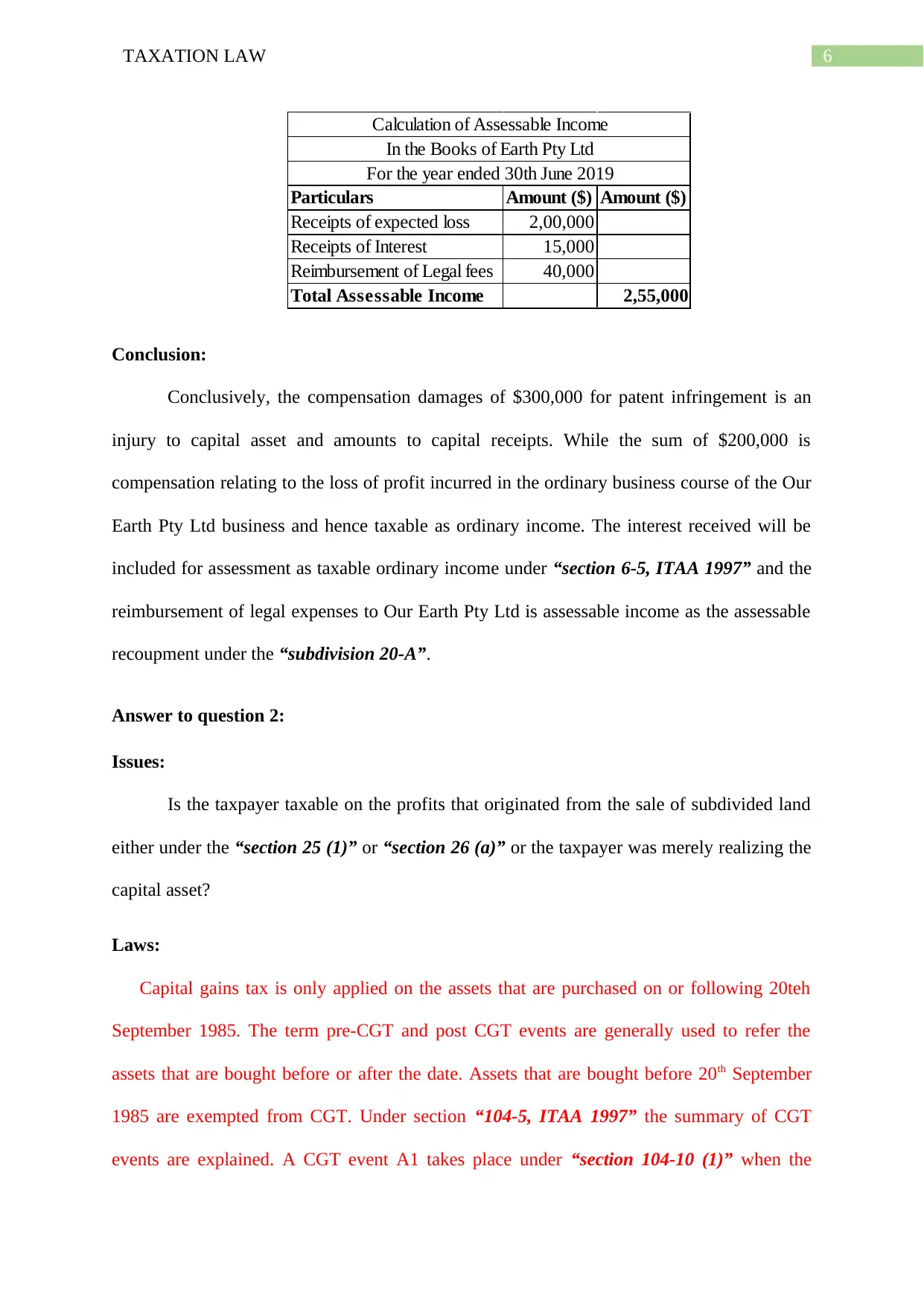
6TAXATION LAW
Particulars Amount ($) Amount ($)
Receipts of expected loss 2,00,000
Receipts of Interest 15,000
Reimbursement of Legal fees 40,000
Total Assessable Income 2,55,000
Calculation of Assessable Income
In the Books of Earth Pty Ltd
For the year ended 30th June 2019
Conclusion:
Conclusively, the compensation damages of $300,000 for patent infringement is an
injury to capital asset and amounts to capital receipts. While the sum of $200,000 is
compensation relating to the loss of profit incurred in the ordinary business course of the Our
Earth Pty Ltd business and hence taxable as ordinary income. The interest received will be
included for assessment as taxable ordinary income under “section 6-5, ITAA 1997” and the
reimbursement of legal expenses to Our Earth Pty Ltd is assessable income as the assessable
recoupment under the “subdivision 20-A”.
Answer to question 2:
Issues:
Is the taxpayer taxable on the profits that originated from the sale of subdivided land
either under the “section 25 (1)” or “section 26 (a)” or the taxpayer was merely realizing the
capital asset?
Laws:
Capital gains tax is only applied on the assets that are purchased on or following 20teh
September 1985. The term pre-CGT and post CGT events are generally used to refer the
assets that are bought before or after the date. Assets that are bought before 20th September
1985 are exempted from CGT. Under section “104-5, ITAA 1997” the summary of CGT
events are explained. A CGT event A1 takes place under “section 104-10 (1)” when the
Particulars Amount ($) Amount ($)
Receipts of expected loss 2,00,000
Receipts of Interest 15,000
Reimbursement of Legal fees 40,000
Total Assessable Income 2,55,000
Calculation of Assessable Income
In the Books of Earth Pty Ltd
For the year ended 30th June 2019
Conclusion:
Conclusively, the compensation damages of $300,000 for patent infringement is an
injury to capital asset and amounts to capital receipts. While the sum of $200,000 is
compensation relating to the loss of profit incurred in the ordinary business course of the Our
Earth Pty Ltd business and hence taxable as ordinary income. The interest received will be
included for assessment as taxable ordinary income under “section 6-5, ITAA 1997” and the
reimbursement of legal expenses to Our Earth Pty Ltd is assessable income as the assessable
recoupment under the “subdivision 20-A”.
Answer to question 2:
Issues:
Is the taxpayer taxable on the profits that originated from the sale of subdivided land
either under the “section 25 (1)” or “section 26 (a)” or the taxpayer was merely realizing the
capital asset?
Laws:
Capital gains tax is only applied on the assets that are purchased on or following 20teh
September 1985. The term pre-CGT and post CGT events are generally used to refer the
assets that are bought before or after the date. Assets that are bought before 20th September
1985 are exempted from CGT. Under section “104-5, ITAA 1997” the summary of CGT
events are explained. A CGT event A1 takes place under “section 104-10 (1)” when the
Paraphrase This Document
Need a fresh take? Get an instant paraphrase of this document with our AI Paraphraser
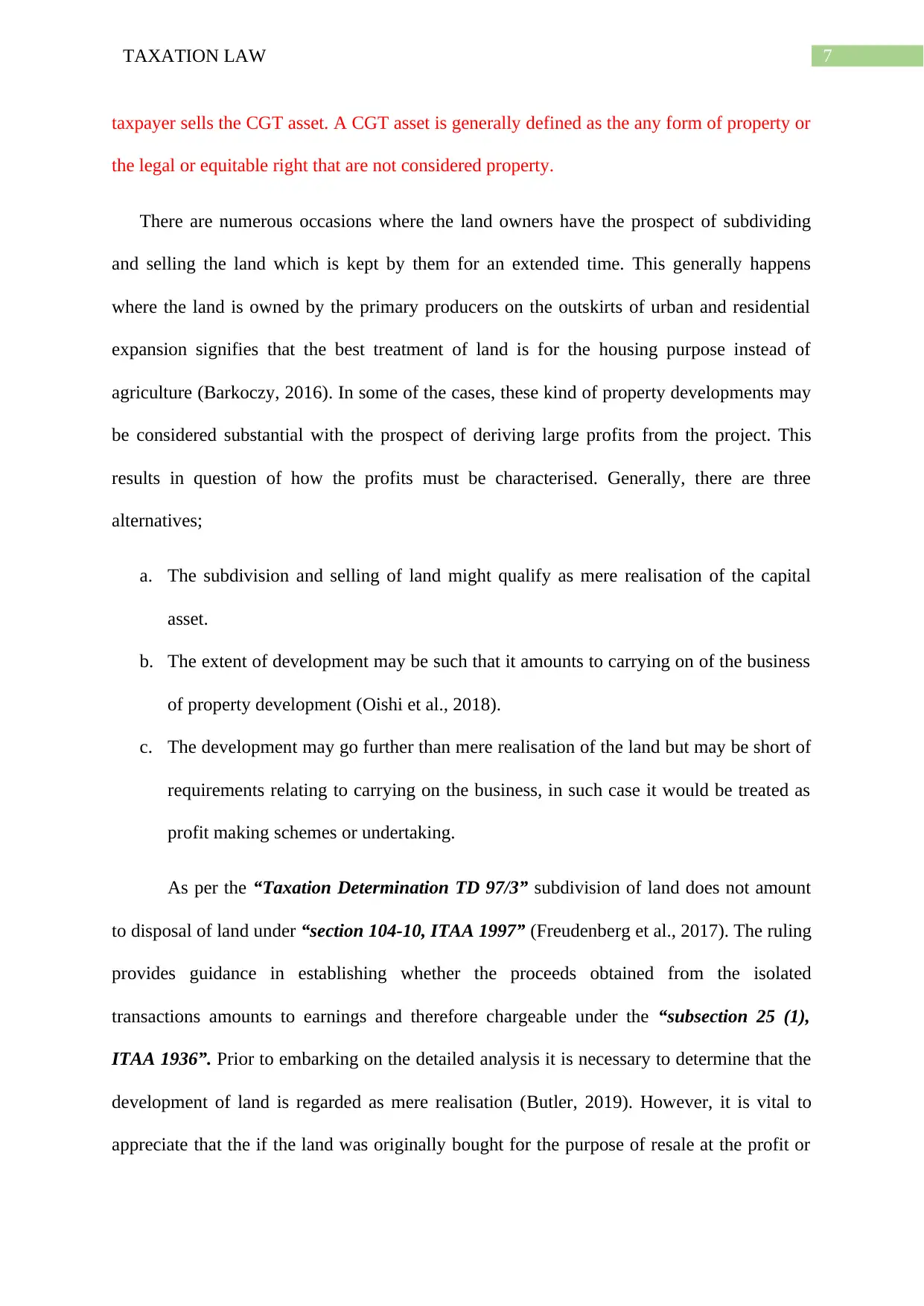
7TAXATION LAW
taxpayer sells the CGT asset. A CGT asset is generally defined as the any form of property or
the legal or equitable right that are not considered property.
There are numerous occasions where the land owners have the prospect of subdividing
and selling the land which is kept by them for an extended time. This generally happens
where the land is owned by the primary producers on the outskirts of urban and residential
expansion signifies that the best treatment of land is for the housing purpose instead of
agriculture (Barkoczy, 2016). In some of the cases, these kind of property developments may
be considered substantial with the prospect of deriving large profits from the project. This
results in question of how the profits must be characterised. Generally, there are three
alternatives;
a. The subdivision and selling of land might qualify as mere realisation of the capital
asset.
b. The extent of development may be such that it amounts to carrying on of the business
of property development (Oishi et al., 2018).
c. The development may go further than mere realisation of the land but may be short of
requirements relating to carrying on the business, in such case it would be treated as
profit making schemes or undertaking.
As per the “Taxation Determination TD 97/3” subdivision of land does not amount
to disposal of land under “section 104-10, ITAA 1997” (Freudenberg et al., 2017). The ruling
provides guidance in establishing whether the proceeds obtained from the isolated
transactions amounts to earnings and therefore chargeable under the “subsection 25 (1),
ITAA 1936”. Prior to embarking on the detailed analysis it is necessary to determine that the
development of land is regarded as mere realisation (Butler, 2019). However, it is vital to
appreciate that the if the land was originally bought for the purpose of resale at the profit or
taxpayer sells the CGT asset. A CGT asset is generally defined as the any form of property or
the legal or equitable right that are not considered property.
There are numerous occasions where the land owners have the prospect of subdividing
and selling the land which is kept by them for an extended time. This generally happens
where the land is owned by the primary producers on the outskirts of urban and residential
expansion signifies that the best treatment of land is for the housing purpose instead of
agriculture (Barkoczy, 2016). In some of the cases, these kind of property developments may
be considered substantial with the prospect of deriving large profits from the project. This
results in question of how the profits must be characterised. Generally, there are three
alternatives;
a. The subdivision and selling of land might qualify as mere realisation of the capital
asset.
b. The extent of development may be such that it amounts to carrying on of the business
of property development (Oishi et al., 2018).
c. The development may go further than mere realisation of the land but may be short of
requirements relating to carrying on the business, in such case it would be treated as
profit making schemes or undertaking.
As per the “Taxation Determination TD 97/3” subdivision of land does not amount
to disposal of land under “section 104-10, ITAA 1997” (Freudenberg et al., 2017). The ruling
provides guidance in establishing whether the proceeds obtained from the isolated
transactions amounts to earnings and therefore chargeable under the “subsection 25 (1),
ITAA 1936”. Prior to embarking on the detailed analysis it is necessary to determine that the
development of land is regarded as mere realisation (Butler, 2019). However, it is vital to
appreciate that the if the land was originally bought for the purpose of resale at the profit or
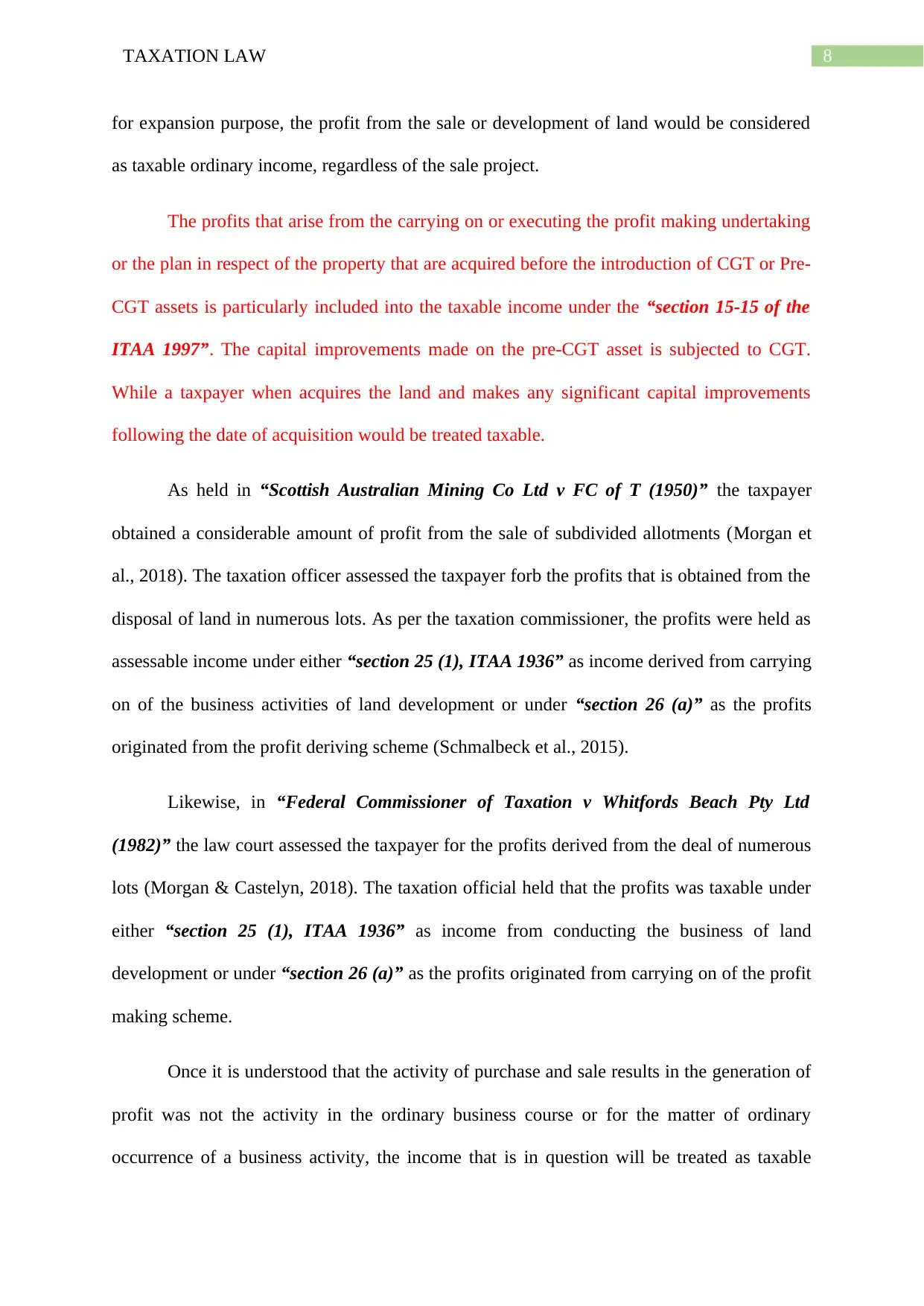
8TAXATION LAW
for expansion purpose, the profit from the sale or development of land would be considered
as taxable ordinary income, regardless of the sale project.
The profits that arise from the carrying on or executing the profit making undertaking
or the plan in respect of the property that are acquired before the introduction of CGT or Pre-
CGT assets is particularly included into the taxable income under the “section 15-15 of the
ITAA 1997”. The capital improvements made on the pre-CGT asset is subjected to CGT.
While a taxpayer when acquires the land and makes any significant capital improvements
following the date of acquisition would be treated taxable.
As held in “Scottish Australian Mining Co Ltd v FC of T (1950)” the taxpayer
obtained a considerable amount of profit from the sale of subdivided allotments (Morgan et
al., 2018). The taxation officer assessed the taxpayer forb the profits that is obtained from the
disposal of land in numerous lots. As per the taxation commissioner, the profits were held as
assessable income under either “section 25 (1), ITAA 1936” as income derived from carrying
on of the business activities of land development or under “section 26 (a)” as the profits
originated from the profit deriving scheme (Schmalbeck et al., 2015).
Likewise, in “Federal Commissioner of Taxation v Whitfords Beach Pty Ltd
(1982)” the law court assessed the taxpayer for the profits derived from the deal of numerous
lots (Morgan & Castelyn, 2018). The taxation official held that the profits was taxable under
either “section 25 (1), ITAA 1936” as income from conducting the business of land
development or under “section 26 (a)” as the profits originated from carrying on of the profit
making scheme.
Once it is understood that the activity of purchase and sale results in the generation of
profit was not the activity in the ordinary business course or for the matter of ordinary
occurrence of a business activity, the income that is in question will be treated as taxable
for expansion purpose, the profit from the sale or development of land would be considered
as taxable ordinary income, regardless of the sale project.
The profits that arise from the carrying on or executing the profit making undertaking
or the plan in respect of the property that are acquired before the introduction of CGT or Pre-
CGT assets is particularly included into the taxable income under the “section 15-15 of the
ITAA 1997”. The capital improvements made on the pre-CGT asset is subjected to CGT.
While a taxpayer when acquires the land and makes any significant capital improvements
following the date of acquisition would be treated taxable.
As held in “Scottish Australian Mining Co Ltd v FC of T (1950)” the taxpayer
obtained a considerable amount of profit from the sale of subdivided allotments (Morgan et
al., 2018). The taxation officer assessed the taxpayer forb the profits that is obtained from the
disposal of land in numerous lots. As per the taxation commissioner, the profits were held as
assessable income under either “section 25 (1), ITAA 1936” as income derived from carrying
on of the business activities of land development or under “section 26 (a)” as the profits
originated from the profit deriving scheme (Schmalbeck et al., 2015).
Likewise, in “Federal Commissioner of Taxation v Whitfords Beach Pty Ltd
(1982)” the law court assessed the taxpayer for the profits derived from the deal of numerous
lots (Morgan & Castelyn, 2018). The taxation official held that the profits was taxable under
either “section 25 (1), ITAA 1936” as income from conducting the business of land
development or under “section 26 (a)” as the profits originated from carrying on of the profit
making scheme.
Once it is understood that the activity of purchase and sale results in the generation of
profit was not the activity in the ordinary business course or for the matter of ordinary
occurrence of a business activity, the income that is in question will be treated as taxable
⊘ This is a preview!⊘
Do you want full access?
Subscribe today to unlock all pages.

Trusted by 1+ million students worldwide
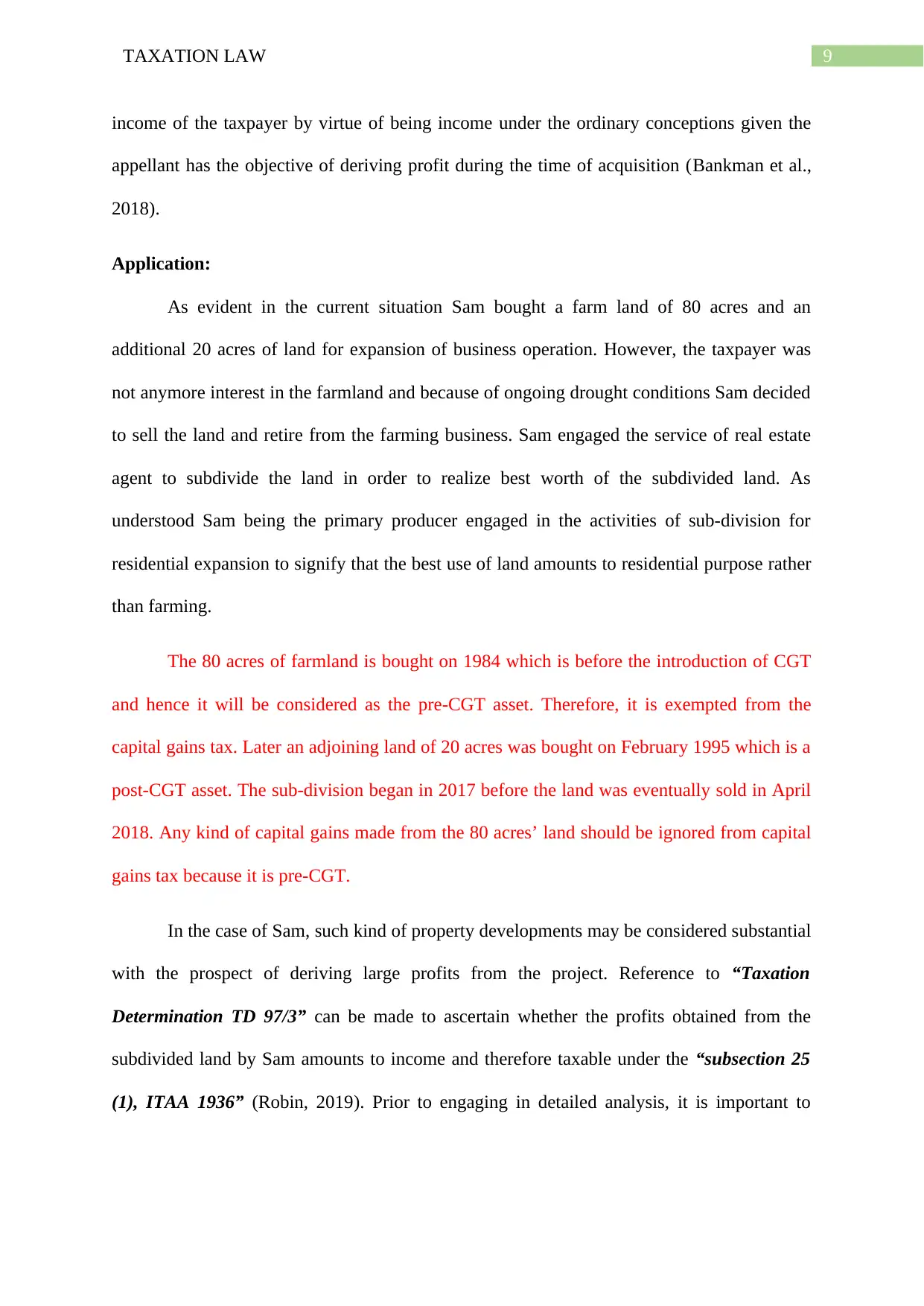
9TAXATION LAW
income of the taxpayer by virtue of being income under the ordinary conceptions given the
appellant has the objective of deriving profit during the time of acquisition (Bankman et al.,
2018).
Application:
As evident in the current situation Sam bought a farm land of 80 acres and an
additional 20 acres of land for expansion of business operation. However, the taxpayer was
not anymore interest in the farmland and because of ongoing drought conditions Sam decided
to sell the land and retire from the farming business. Sam engaged the service of real estate
agent to subdivide the land in order to realize best worth of the subdivided land. As
understood Sam being the primary producer engaged in the activities of sub-division for
residential expansion to signify that the best use of land amounts to residential purpose rather
than farming.
The 80 acres of farmland is bought on 1984 which is before the introduction of CGT
and hence it will be considered as the pre-CGT asset. Therefore, it is exempted from the
capital gains tax. Later an adjoining land of 20 acres was bought on February 1995 which is a
post-CGT asset. The sub-division began in 2017 before the land was eventually sold in April
2018. Any kind of capital gains made from the 80 acres’ land should be ignored from capital
gains tax because it is pre-CGT.
In the case of Sam, such kind of property developments may be considered substantial
with the prospect of deriving large profits from the project. Reference to “Taxation
Determination TD 97/3” can be made to ascertain whether the profits obtained from the
subdivided land by Sam amounts to income and therefore taxable under the “subsection 25
(1), ITAA 1936” (Robin, 2019). Prior to engaging in detailed analysis, it is important to
income of the taxpayer by virtue of being income under the ordinary conceptions given the
appellant has the objective of deriving profit during the time of acquisition (Bankman et al.,
2018).
Application:
As evident in the current situation Sam bought a farm land of 80 acres and an
additional 20 acres of land for expansion of business operation. However, the taxpayer was
not anymore interest in the farmland and because of ongoing drought conditions Sam decided
to sell the land and retire from the farming business. Sam engaged the service of real estate
agent to subdivide the land in order to realize best worth of the subdivided land. As
understood Sam being the primary producer engaged in the activities of sub-division for
residential expansion to signify that the best use of land amounts to residential purpose rather
than farming.
The 80 acres of farmland is bought on 1984 which is before the introduction of CGT
and hence it will be considered as the pre-CGT asset. Therefore, it is exempted from the
capital gains tax. Later an adjoining land of 20 acres was bought on February 1995 which is a
post-CGT asset. The sub-division began in 2017 before the land was eventually sold in April
2018. Any kind of capital gains made from the 80 acres’ land should be ignored from capital
gains tax because it is pre-CGT.
In the case of Sam, such kind of property developments may be considered substantial
with the prospect of deriving large profits from the project. Reference to “Taxation
Determination TD 97/3” can be made to ascertain whether the profits obtained from the
subdivided land by Sam amounts to income and therefore taxable under the “subsection 25
(1), ITAA 1936” (Robin, 2019). Prior to engaging in detailed analysis, it is important to
Paraphrase This Document
Need a fresh take? Get an instant paraphrase of this document with our AI Paraphraser
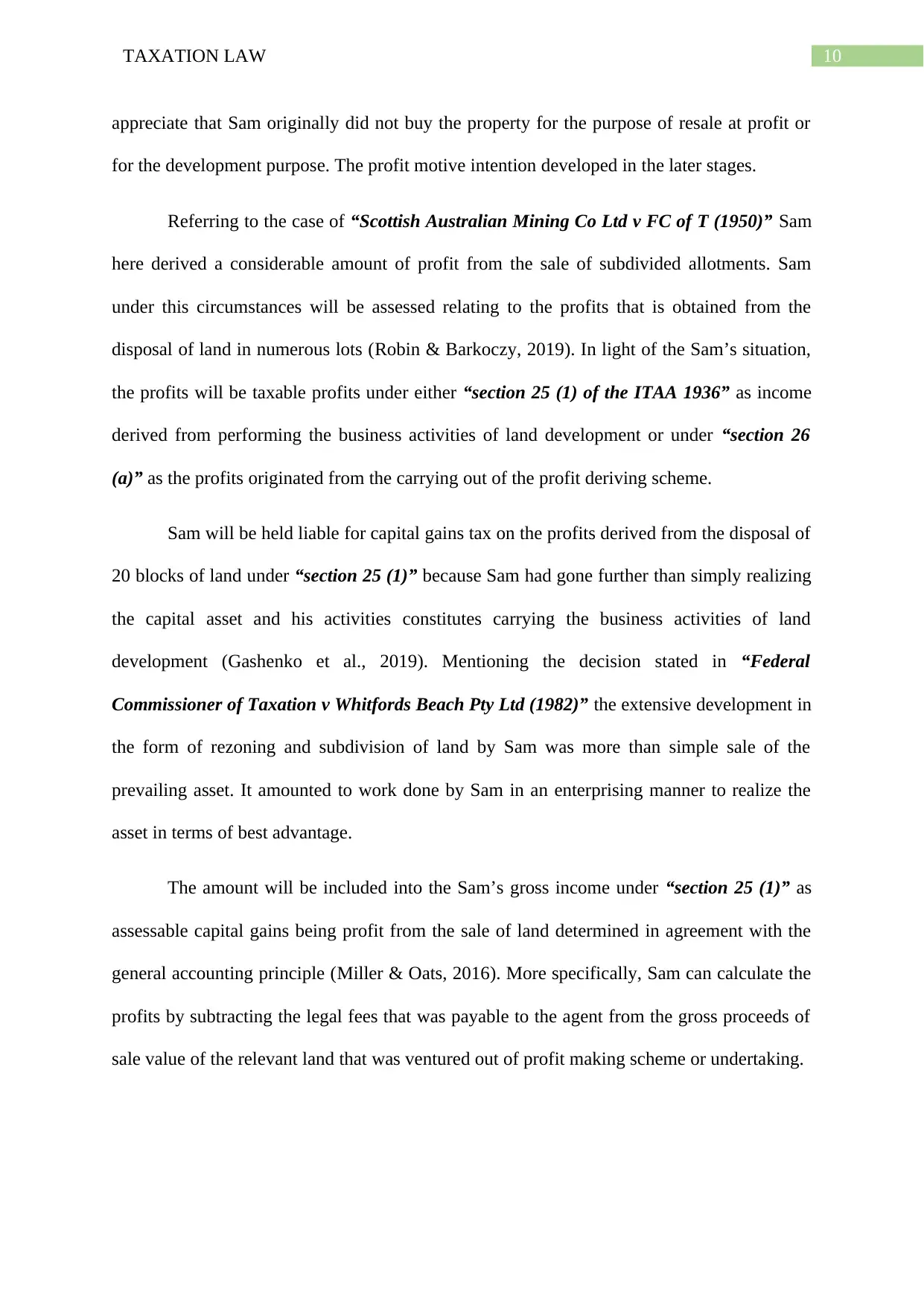
10TAXATION LAW
appreciate that Sam originally did not buy the property for the purpose of resale at profit or
for the development purpose. The profit motive intention developed in the later stages.
Referring to the case of “Scottish Australian Mining Co Ltd v FC of T (1950)” Sam
here derived a considerable amount of profit from the sale of subdivided allotments. Sam
under this circumstances will be assessed relating to the profits that is obtained from the
disposal of land in numerous lots (Robin & Barkoczy, 2019). In light of the Sam’s situation,
the profits will be taxable profits under either “section 25 (1) of the ITAA 1936” as income
derived from performing the business activities of land development or under “section 26
(a)” as the profits originated from the carrying out of the profit deriving scheme.
Sam will be held liable for capital gains tax on the profits derived from the disposal of
20 blocks of land under “section 25 (1)” because Sam had gone further than simply realizing
the capital asset and his activities constitutes carrying the business activities of land
development (Gashenko et al., 2019). Mentioning the decision stated in “Federal
Commissioner of Taxation v Whitfords Beach Pty Ltd (1982)” the extensive development in
the form of rezoning and subdivision of land by Sam was more than simple sale of the
prevailing asset. It amounted to work done by Sam in an enterprising manner to realize the
asset in terms of best advantage.
The amount will be included into the Sam’s gross income under “section 25 (1)” as
assessable capital gains being profit from the sale of land determined in agreement with the
general accounting principle (Miller & Oats, 2016). More specifically, Sam can calculate the
profits by subtracting the legal fees that was payable to the agent from the gross proceeds of
sale value of the relevant land that was ventured out of profit making scheme or undertaking.
appreciate that Sam originally did not buy the property for the purpose of resale at profit or
for the development purpose. The profit motive intention developed in the later stages.
Referring to the case of “Scottish Australian Mining Co Ltd v FC of T (1950)” Sam
here derived a considerable amount of profit from the sale of subdivided allotments. Sam
under this circumstances will be assessed relating to the profits that is obtained from the
disposal of land in numerous lots (Robin & Barkoczy, 2019). In light of the Sam’s situation,
the profits will be taxable profits under either “section 25 (1) of the ITAA 1936” as income
derived from performing the business activities of land development or under “section 26
(a)” as the profits originated from the carrying out of the profit deriving scheme.
Sam will be held liable for capital gains tax on the profits derived from the disposal of
20 blocks of land under “section 25 (1)” because Sam had gone further than simply realizing
the capital asset and his activities constitutes carrying the business activities of land
development (Gashenko et al., 2019). Mentioning the decision stated in “Federal
Commissioner of Taxation v Whitfords Beach Pty Ltd (1982)” the extensive development in
the form of rezoning and subdivision of land by Sam was more than simple sale of the
prevailing asset. It amounted to work done by Sam in an enterprising manner to realize the
asset in terms of best advantage.
The amount will be included into the Sam’s gross income under “section 25 (1)” as
assessable capital gains being profit from the sale of land determined in agreement with the
general accounting principle (Miller & Oats, 2016). More specifically, Sam can calculate the
profits by subtracting the legal fees that was payable to the agent from the gross proceeds of
sale value of the relevant land that was ventured out of profit making scheme or undertaking.
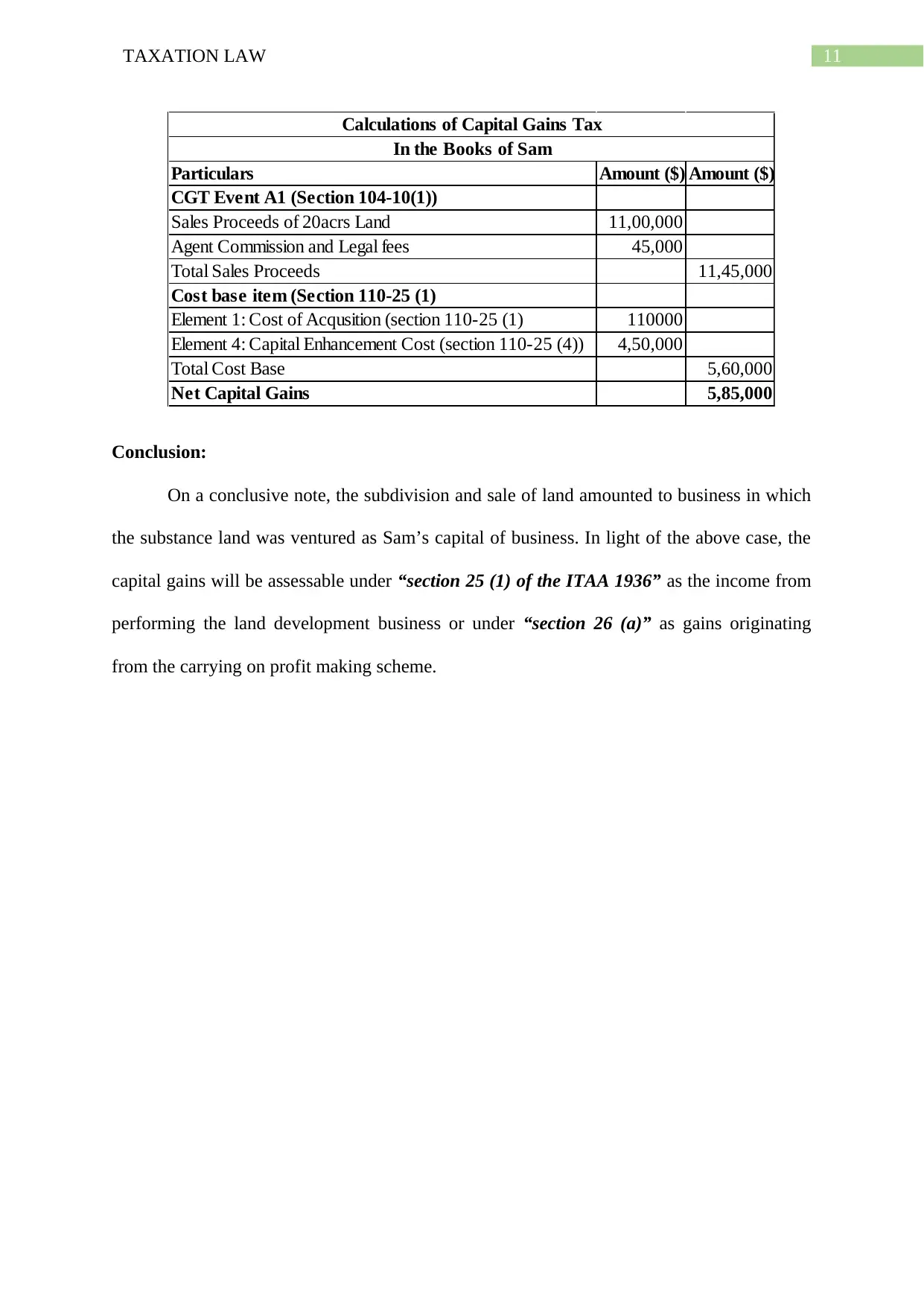
11TAXATION LAW
Particulars Amount ($) Amount ($)
CGT Event A1 (Section 104-10(1))
Sales Proceeds of 20acrs Land 11,00,000
Agent Commission and Legal fees 45,000
Total Sales Proceeds 11,45,000
Cost base item (Section 110-25 (1)
Element 1: Cost of Acqusition (section 110-25 (1) 110000
Element 4: Capital Enhancement Cost (section 110-25 (4)) 4,50,000
Total Cost Base 5,60,000
Net Capital Gains 5,85,000
Calculations of Capital Gains Tax
In the Books of Sam
Conclusion:
On a conclusive note, the subdivision and sale of land amounted to business in which
the substance land was ventured as Sam’s capital of business. In light of the above case, the
capital gains will be assessable under “section 25 (1) of the ITAA 1936” as the income from
performing the land development business or under “section 26 (a)” as gains originating
from the carrying on profit making scheme.
Particulars Amount ($) Amount ($)
CGT Event A1 (Section 104-10(1))
Sales Proceeds of 20acrs Land 11,00,000
Agent Commission and Legal fees 45,000
Total Sales Proceeds 11,45,000
Cost base item (Section 110-25 (1)
Element 1: Cost of Acqusition (section 110-25 (1) 110000
Element 4: Capital Enhancement Cost (section 110-25 (4)) 4,50,000
Total Cost Base 5,60,000
Net Capital Gains 5,85,000
Calculations of Capital Gains Tax
In the Books of Sam
Conclusion:
On a conclusive note, the subdivision and sale of land amounted to business in which
the substance land was ventured as Sam’s capital of business. In light of the above case, the
capital gains will be assessable under “section 25 (1) of the ITAA 1936” as the income from
performing the land development business or under “section 26 (a)” as gains originating
from the carrying on profit making scheme.
⊘ This is a preview!⊘
Do you want full access?
Subscribe today to unlock all pages.

Trusted by 1+ million students worldwide
1 out of 15
Related Documents
Your All-in-One AI-Powered Toolkit for Academic Success.
+13062052269
info@desklib.com
Available 24*7 on WhatsApp / Email
![[object Object]](/_next/static/media/star-bottom.7253800d.svg)
Unlock your academic potential
Copyright © 2020–2026 A2Z Services. All Rights Reserved. Developed and managed by ZUCOL.




